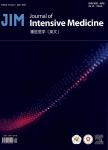Health-related quality of life and stress-related disorders in COVID-19 ICU survivors:Are they worse than with other causes of ARDS?
Health-related quality of life and stress-related disorders in COVID-19 ICU survivors: Are they worse than with other causes of ARDS?作者机构:Department of Anaesthesiology and Critical CareRamón y Cajal Hospital28034 MadridSpain Department of PsychologyRamón y Cajal Hospital28034 MadridSpain
出 版 物:《Journal of Intensive Medicine》 (重症医学(英文))
年 卷 期:2022年第2卷第2期
页 面:103-109页
基 金:This research did not receive any specific grant from funding agencies in the public commercial or not-for-profit sectors.
主 题:COVID-19 Post-intensive care syndrome Respiratory distress syndrome,Adult Health-related quality of life Post-traumatic stress disorder
摘 要:Background:There are insufficient data regarding the impact of acute respiratory distress syndrome related to coronavirus disease 2019(C-ARDS)–caused by severe acute respiratory syndrome coronavirus 2(SARS-CoV-2)–on health-related quality of life(HRQoL)and the occurrence of stress-related disorders in coronavirus disease 2019(COVID-19)intensive care unit(ICU)survivors.The aim of this study is to assess HRQoL and the occurrence of stress-related disorders(acute stress disorder[ASD]and post-traumatic stress disorder[PTSD])in C-ARDS ICU survivors at 1 and 6 months following hospital discharge.Methods:This prospective observational study included 90 patients treated for C-ARDS between March and May 2020 in the ICU and discharged alive from the hospital.All patients included in the study were contacted by telephone 1 month and 6 months post-hospital discharge to assess the presence of symptoms of stress-related disorders and HRQoL using the 8-item Treatment Outcome Post-traumatic Stress Disorder scale(TOP-8)and 36-item Short Form survey(SF-36).We performed univariate analyses to evaluate differences between patients who developed stress and those who did not.We also compared SF-36 scores in our sample with data from the general Spanish population and from cohorts of non–C-ARDS and severe acute respiratory syndrome coronavirus-1(SARS-CoV-1)survivors.Results:There are 24.1%of patients showed symptoms of ASD;in 13.5%of cases the symptoms persisted 6 months later.Risk factors for the development of symptoms of ASD and PTSD are younger age,female sex,obesity,a previously diagnosed psychiatric disease and disease severity at ICU admission(P0.05).HRQoL was greatly affected by C-ARDS;however,there was improvement on all scales of the SF-36 at the 6-month follow-up(P0.05).The mean SF-36 score of our sample was higher than those previously reported in non–C-ARDS survivors(P0.05)for physical functioning(78.0 vs.52.0),role functioning/physical(51.0 vs.31.0),bodily pain(76.1 vs.57.0),vitality(58.6 vs.48.0),social function(72.6 vs.63.0)and role emotional(77.4 vs.55.0),except on the general health scale.C-ARDS survivors also scored better than SARS-CoV-1 survivors on all scales except for body pain(P0.05).Conclusions:The impact of C-ARDS on HRQoL is substantial,with frequent occurrence of PTSD symptoms.Patients are heavily affected in all areas of health in the first month of post-hospital discharge but show a dramatic improvement within 6 months,especially in terms of physical health.



